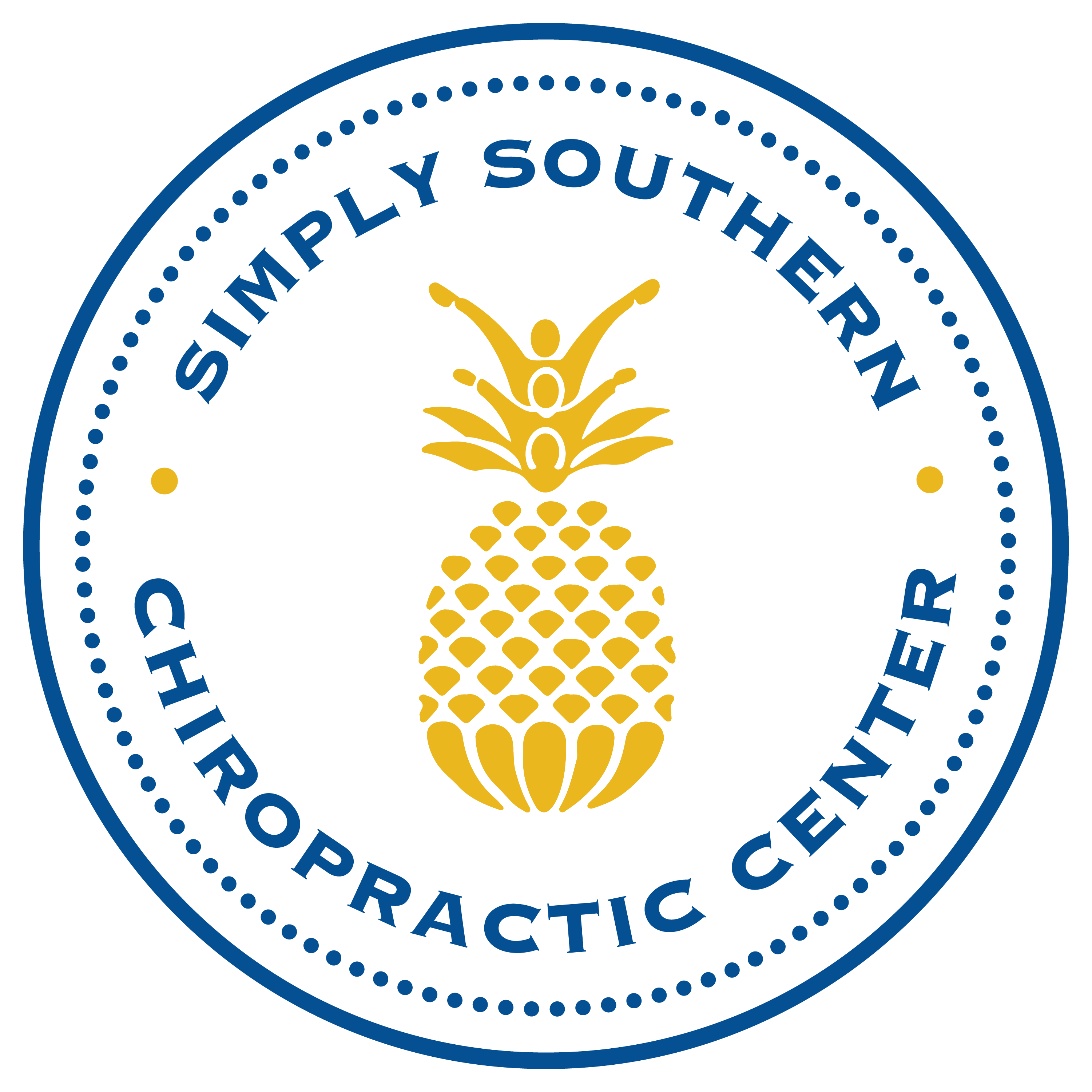
Key Points
•Other ways to support your spinal health include regular resistance training, going for walks, eating a healthy, colorful diet, and more.
•The two best supplements for spine health and strong bones are vitamin D and collagen.
•Vitamin D allows our bones (including the vertebrae of the spine) to absorb calcium, while collagen supports the structure of our spinal discs and joints.
•Most of us aren’t getting enough of either of these key nutrients due to more time spent indoors, low protein diets, and processed food consumption.
•We recommend a liquid vitamin D and liquid collagen supplement to our patients for better absorption and bioavailability in the body.
Table of Contents:
- Supplement Recommendations
- Vitamin D for Spine Health
- Collagen for Spine Health
- Types of Collagen
- The Best Vitamin D and Collagen Supplements
- Other Ways to Support Spine Health
- Prevention is the Best Cure
- References
Supplement Recommendations
At Simply Southern Chiropractic Center (SSCC), there are only two supplements we recommend to just about everyone for spinal health and strong bones: vitamin D and collagen.
After listening to hundreds of milk commercials growing up, many people believe that calcium is the most important nutrient for strong bones. And while calcium is certainly crucial for bone strength and many other functions in the body, we need vitamin D for our bones to be able to absorb calcium.
In addition, we need collagen for supporting cartilage throughout the body, such as the discs between the vertebrae in your spine.
So these two supplements together are what we recommend to most people for maintaining a strong healthy spine, alongside a healthy diet. Let’s take a deeper look at why you need these nutrients for spine health, why you probably aren’t getting enough in your diet, the best vitamin D and collagen supplements, and a few other ways to support spine health.
Vitamin D for Spine Health
Vitamin D is essential for spine health and strong bones because we need vitamin D in order to draw calcium into our bones. Without vitamin D, it is possible to accumulate too much calcium in the body and yet still have weak bones because the calcium cannot be absorbed. High calcium may also lead to an increased risk of kidney stones and other unpleasant digestive and neurological symptoms.
All in all, it’s extremely important that we get enough vitamin D so that we can keep calcium in our bones where it will do us the most good. Normally, your body produces vitamin D in response to sunlight hitting your skin. You can get a little vitamin D from foods like salmon and beef liver, but not enough to fully support your body.
Since most of us spend a lot of time indoors these days (at work, in school, staying inside during the winter months, etc.), taking a high quality vitamin D supplement becomes essential.
At SSCC, we recommend that our patients take a liquid vitamin D that is both more absorbable and can easily be adjusted based on patient needs. On average, we recommend most people take 5,000 IUs daily as a maintenance dose after “onboarding” with a higher initial dose. For most people, if they spend a majority of their time indoors and have never taken vitamin D before, this initial dose is 20,000 IUs daily for six weeks. However, depending on your health history and other factors, you may need a different dosing protocol. Always consult with your healthcare provider on the right plan for you.
Collagen for Spine Health
The second key supplement we recommend for spine health is collagen. Collagen has been a popular product in the health and wellness world for a long time now, but most people don’t know about its benefits for disc health.
Collagen is essentially a type of protein that forms the scaffolding that holds our tissues together. It’s made from the amino acids proline, glycine and hydroxyproline and accounts for about 30% of the protein in your body. It is a key component of the discs in your spine, which are made of cartilage. When cartilage begins to break down due to injury, illness or age, discs between the vertebrae of the spine start to wear down and cause degenerative disc disease.
If the cartilage between vertebrae deteriorates significantly and vertebrae become bone-on-bone, back surgery may become inevitable and conservative chiropractic care will no longer work to relieve pain. This is the worst case scenario we are working to prevent. We all degenerate as we age, and osteoarthritis (degeneration of the bone) and degenerative disc disease (degeneration of discs) go together like pizza and beer, peanut butter and jelly — you get the idea. But even though some degeneration is expected with aging, we can use nutritional tools like vitamin D and collagen to slow down that degeneration as much as possible — and hopefully prevent major surgery from ever becoming necessary.
While it used to be believed that cartilage is impossible to repair or regain once it’s gone, new research suggests that some cartilage may be able to repair itself with a little help. However, it’s far better to prevent cartilage loss or damage in the first place. That’s why we recommend taking collagen daily.
We recommend our patients take a high-quality, medical grade liquid collagen that we have available here in the clinic. Just like vitamin D, we recommend a liquid collagen because it is more absorbable and bioavailable to the body.
Types of Collagen
A quick note on types of collagen: you’ll see that collagen supplements often list a type I, II, III, or IV on the label. You don’t have to worry too much about these types, but know that type I and II are the most important for your bones and cartilage, which supports healthy spinal discs and joints. So simply make sure that the collagen supplement you buy has these types included.
In case you’re curious, types III, IV, and V support tissues in your muscles, organs, arteries, skin, eyes, and for pregnant women, the placenta. In general, taking collagen is great for your hair, skin, and nails as well.
The Best Vitamin D and Collagen Supplements
We always recommend a liquid vitamin D supplement and medical grade liquid collagen supplement to our patients at SSCC. Liquid supplements tend to be more absorbable and more easily used by the body.
If you have questions about vitamin D and collagen supplements for spine health, feel free to schedule an appointment with us or stop by our Greenville or Greer, SC offices. We’re happy to help!
Other Ways to Support Spine Health
You can also support the health of your spine by:
● Practicing resistance training 2-3 times per week
● Taking walks daily (even as a short break during your work day)
● Practicing yoga or stretching
● Eating a healthy, colorful diet
● Regularly seeing a chiropractor for routine adjustments
Resistance training (ideally lifting medium to heavy weights) helps not only build your muscles but also strengthen and generate new bone cells. Exercise like this is extremely important to prevent bone loss and conditions like osteoarthritis that are often seen in older adults. Properly performed resistance training can also help prevent injury if you play sports or participate in recreational activities like cycling, running, and climbing.
Eating a healthy diet with a diverse range of nutrients is also important to support the spine and bones. For example, you need vitamins and minerals like vitamin C, zinc, and copper to produce collagen that makes up your joints and spinal discs. Alongside collagen supplementation, getting these nutrients in your diet can support a strong, healthy spine. As for calcium, you’ll actually find a lot more in leafy greens than you will in milk!
Prevention is the Best Cure
As chiropractors, we want to see all of our patients live vibrant, healthy, mobile lives for as long as possible. That’s why we recommend just about everyone take vitamin D and collagen on a regular basis to support spine health. You may find that taking these supplements have added benefits as well, like improved immunity, reduced seasonal depression, and healthier hair, skin, and nails.
Still have questions or want to make an appointment with one of our experienced chiropractors in Greenville or Greer? Go ahead and schedule a new patient appointment today!
References
Matikainen, N., Pekkarinen, T., Ryhänen, E. M., & Schalin-Jäntti, C. (2021). Physiology of
Calcium Homeostasis: An Overview. Endocrinology and metabolism clinics of North America,
50(4), 575–590. https://doi.org/10.1016/j.ecl.2021.07.005
Hong, A. R., & Kim, S. W. (2018). Effects of Resistance Exercise on Bone Health.
Endocrinology and metabolism (Seoul, Korea), 33(4), 435–444.
https://doi.org/10.3803/EnM.2018.33.4.435
Bouillon, R., Marcocci, C., Carmeliet, G., Bikle, D., White, J. H., Dawson-Hughes, B., Lips, P.,
Munns, C. F., Lazaretti-Castro, M., Giustina, A., & Bilezikian, J. (2019). Skeletal and
Extraskeletal Actions of Vitamin D: Current Evidence and Outstanding Questions. Endocrine
reviews, 40(4), 1109–1151. https://doi.org/10.1210/er.2018-00126
Holick, M. F., & Chen, T. C. (2008). Vitamin D deficiency: a worldwide problem with health
consequences. The American journal of clinical nutrition, 87(4), 1080S–6S.
https://doi.org/10.1093/ajcn/87.4.1080S
Daneault, A., Prawitt, J., Fabien Soulé, V., Coxam, V., & Wittrant, Y. (2017). Biological effect of
hydrolyzed collagen on bone metabolism. Critical reviews in food science and nutrition, 57(9),
1922–1937. https://doi.org/10.1080/10408398.2015.1038377
Aszódi, A., Chan, D., Hunziker, E., Bateman, J. F., & Fässler, R. (1998). Collagen II is essential
for the removal of the notochord and the formation of intervertebral discs. The Journal of cell
biology, 143(5), 1399–1412. https://doi.org/10.1083/jcb.143.5.1399
Farì, G., Santagati, D., Pignatelli, G., Scacco, V., Renna, D., Cascarano, G., Vendola, F.,
Bianchi, F. P., Fiore, P., Ranieri, M., & Megna, M. (2022). Collagen Peptides, in Association with
Vitamin C, Sodium Hyaluronate, Manganese and Copper, as Part of the Rehabilitation Project in
the Treatment of Chronic Low Back Pain. Endocrine, metabolic & immune disorders drug
targets, 22(1), 108–115. https://doi.org/10.2174/1871530321666210210153619
